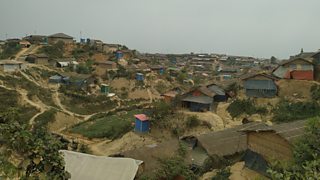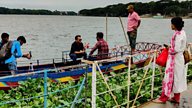Media Action Insight Blog
Featured Post
Shoring up Bangladesh’s ‘fourth pillar’: Examining journalists’ rights and responsibilities in Bangladesh
Shahrin Ahsan, Project officer, media development - Bangladesh
Posts
-
How do media in Bangladesh understand gender sensitivity?
Udisa Islam
Special correspondent, Bangla Tribune
Tagged with:
Bangladesh ranks 163rd in the world in the Press Freedom Index and journalists face difficult working conditions, with poor pay and little job security. ���Ͽ�����¼ Media Action has been working through Protecting Independent Media for Effective Development (PRIMED) to support local media associations in their efforts at change. In this third of three articles, our guest blogger Udisa Islam, special correspondent for the Bangla Tribune, examines the issue of gender equality in media in Bangladesh.
The time has come to question how Bangladesh’s media outlets are navigating gender equality. Our mass media has reached adulthood, after a history of ups and downs. One significant way to measure the maturity of media is its sensitivity to issues of gender. We need to find solutions to the questions of why the media should become gender-sensitive, and how.
It is time to talk about the presence of women in media, the representation of women in media, and the working environment for women working in media.
It is cliché to state that journalism is challenging. Since the beginning of my work in the media, I have often heard that women face greater risk in this profession. In a country like…
-
Realities and opportunities for Bangladesh's media
Syed Ishtiaque Reza
Editor in chief, Global Television, Bangladesh
Tagged with:
Bangladesh ranks 163rd in the world in the Press Freedom Index and journalists face difficult working conditions, with poor pay and little job security. ���Ͽ�����¼ Media Action has been working through Protecting Independent Media for Effective Development (PRIMED) to support local media associations in their efforts at change. In this second in a series of three articles, Bangladesh Global TV Editor in Chief Syed Ishtiaque Reza explores recent findings on working conditions for journalists in Bangladesh and discusses the pressures on local media.
"In our childhood, affluent people used to keep pet dogs. Later, people who gained wealth started to keep media.
These [media] are like Alsatian dogs."
This was a remark by a top politician at a public meeting in Bangladesh. This lawmaker is not alone. Many politicians and social stalwarts on many occasions make such disparaging remarks about journalists and the profession in general. And, in our sharply divided political environment, Bangladesh’s journalist community is also divided by politics. There are two trade union bodies, each with its own political allegiances..
Media are under political, economic and legal threats in Bangladesh.…
-
Shoring up Bangladesh’s ‘fourth pillar’: Examining journalists’ rights and responsibilities in Bangladesh
Shahrin Ahsan
Project officer, media development - Bangladesh
Tagged with:
Bangladesh ranks 163rd in the world in the Press Freedom Index and journalists face difficult working conditions, with poor pay and little job security. ���Ͽ�����¼ Media Action has been working through Protecting Independent Media for Effective Development (PRIMED) to support local media associations in their efforts at change. In this series of three articles, we examine recent findings on working conditions, and hear directly from local journalists about the pressures on local media, and how to address gender representation in media.
The COVID-19 pandemic ended Selim (not his real name)’s 12-year career in television.
But Selim received no compensation or medical insurance from his former employer. And he was not alone: countless TV reporters in Bangladesh faced the same fate, due to the lack of a separate labour law for broadcast journalists in Bangladesh. Others who retained their jobs received irregular payments; most outlets did not follow national wage board structures.
Data from a recent survey conducted by the Broadcast Journalist Centre (BJC) shows the ‘fourth pillar’ of our state is at risk: their labour rights are not being protected, at outlet and national level.
������…
-
Time to unite in support of independent media
James Deane
Head of Policy
Tagged with:
Just over a year on from the first Summit for Democracy, the backdrop for this year’s event – co-hosted by the United States, the Netherlands, South Korea and Zambia – is both very different, and depressingly similar.
It is entirely different in that the Russian invasion of Ukraine has prompted concerted and deep seated effort among democracies committed to showing common cause with extraordinary Ukrainian resistance against autocratic invasion. As recently as 18 months ago, these same countries were still fractured and quarrelsome over issues as diverse as procurement of submarines and COVID…
-
Seven lessons from scaling up mHealth in India
Sara Chamberlain, Radharani Mitra, Anna Godfrey
���Ͽ�����¼ Media Action
Tagged with:
Our challenge: How do we ensure families in India have timely information about childbirth, childcare and family planning, during pregnancy and in the first year of the child's life?
The innovation: High-quality health information and advice to Indian families - particularly in rural areas – through the growing use of basic mobile phones. Our human-centred design mobile health solution has been scaled to 17 states by the Government of India to empower families and frontline health workers to improve child mortality and maternal health.
Kilkari (a baby’s gurgle) is our mobile messaging service…
-
Out from the shadows: Tackling the stigma of disability in refugee communities
Fariha Rahman
Bangladesh research officer, ���Ͽ�����¼ Media Action
Tagged with:

A Rohingya refugee camp in Cox's Bazar, Bangladesh. Mrittika Deb Purba/���Ͽ�����¼ Media Action Bangladesh
Cox’s Bazar is the home of more than 900,000 Rohingya people living in refugee camps, of whom an . We recently conducted with people with disabilities living in the camps, to understand what barriers they face in accessing information, participating in decision-making activities, making complaints and giving feedback to the humanitarian agencies…
-
Using noodles and Granny's biscuit tin to address climate change in Indonesia
Pravita Kusumaningtias
Project officer, ���Ͽ�����¼ Media Action Indonesia
Tagged with:
Indonesia is one of the youngest offices of ���Ͽ�����¼ Media Action. One of our projects is focused on green growth and climate change and is aimed at young people. On social media platforms, our brand, (Our Action) is sharing compelling information and insights, reaching millions and sparking conversations amongst our audiences across the Indonesian archipelago through Instagram, Youtube, Tiktok, and Twitter.
We’ve found that the best way to communicate about such issues and how they're affecting each one of us is by using aspects of everyday life that young people can easily…
-
Understanding young people’s civic engagement in Cambodia
Vichheka Sao
Research manager, ���Ͽ�����¼ Media Action Cambodia
For more than a decade, ���Ͽ�����¼ Media Action has worked to support young people in Cambodia – on issues including sexual and reproductive health, and job-hunting skills in a difficult labour market. We’ve done this through our brands Loy9, Love9 and more recently Klahan9 (Brave 9) – engaging young people where they are, through reality TV, social media and in road shows.
In 2020 we wanted to focus on how to engage more young people in civic life. We knew that people were hesitant to participate in public life, didn’t discuss politics and civic issues with others, and were fearful of doing so.…
-
Designing for inclusion: From invisible to #Invaluables
Varinder Kaur Gambhir, Soma Katiyar and Ragini Pasricha
���Ͽ�����¼ Media Action India
Tagged with:
Cities tend to forget the very people who are their lifeline.
The 12.5 million denizens of Bengaluru, known as India’s Silicon Valley, generate 5,757 metric tonnes of solid waste per day.
But the city’s estimated 30,000 informal waste pickers, who form the backbone of Bengaluru’s waste management system, are invisible and ignored. They live in deplorable conditions with low and unstable incomes, face significant workplace hazards, and are treated with suspicion and contempt.
Funded by the H&M Foundation, Saamuhika Shakti (SaaS, the Collective Impact Initiative), aims to address this…
-
Supporting media and humanitarian practitioners to overcome communication challenges
Nicola Bailey
Senior research manager, ���Ͽ�����¼ Media Action
Tagged with:

Displaced young Syrians wait to receive humanitarian aid. Credit: Getty Images
The fourth commitment which humanitarian agencies sign up to under the states that ‘Communities and people affected by crisis know their rights and entitlements, have access to information and participate in decisions which affect them’. But for humanitarian practitioners, particularly those working in settings where humanitarian access is limited, sharing relevant,…










